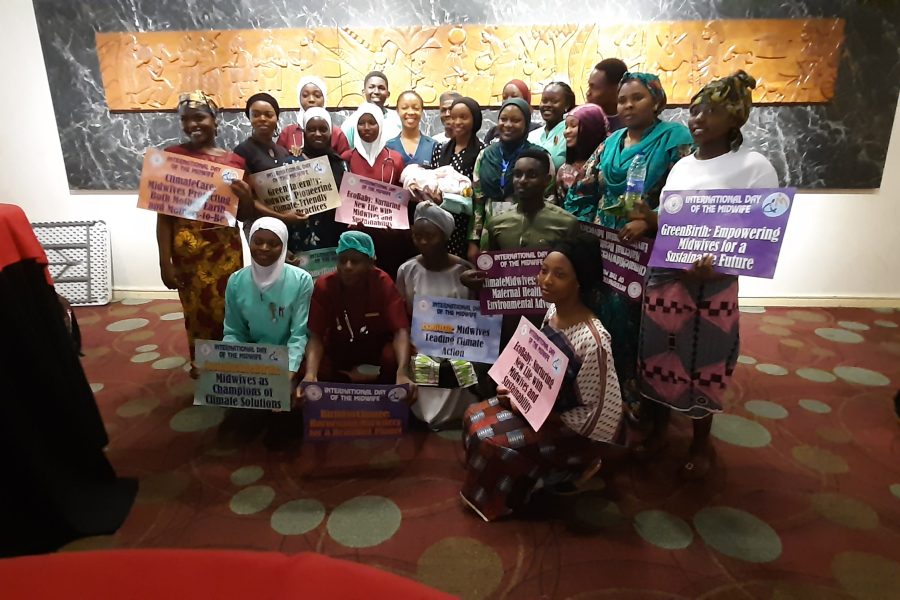Report: International Day of the Midwife 2024
Theme: “Midwives: A Vital Climate Solution”
Location: Nigeria
Date: May 6th, 2024
Introduction
The International Day of the Midwife 2024 in Nigeria focused on the theme “Midwives: A Vital Climate Solution.” This year’s celebration highlighted the essential role of midwives in promoting sustainable healthcare practices and their potential impact on climate resilience. The event brought together healthcare professionals, policymakers, community leaders, and the public to recognize midwives’ contributions to maternal and child health and their critical role in addressing climate-related challenges. This report provides an overview of the event, key activities, discussions, and recommendations for integrating midwifery into broader climate action strategies.
The National Association of Nigeria Nurses and Midwives (NANNM), with the support of UNFPA, marked the International Day of the Midwife. This day is observed annually on May 5th to recognize the invaluable contributions of midwives globally. In 2024, the theme “Midwives: A Vital Climate Solution” highlighted the connection between midwifery and environmental sustainability. The celebration in Nigeria was especially significant due to the country’s exposure to climate change impacts such as heat waves, flooding, and health challenges. The event aimed to explore the role of midwives in supporting climate adaptation efforts and promoting sustainable health practices.
Objectives
- Raise Awareness: Highlight the role of midwives in contributing to climate resilience and sustainable health practices.
- Advocate for Policy Support: Engage policymakers to integrate midwifery into national climate and health strategies.
- Empower Midwives: Provide education and resources to empower midwives as advocates for climate action within their communities.
- Strengthen Networks: Foster collaboration between midwifery professionals, healthcare systems, and environmental stakeholders.
PICTURES OF ACTIVITIES AT THE 2024 INTERNATIONAL DAY OF THE MIDWIFE.
- Opening Ceremony: The event commenced with an opening speech by the Minister of Health, emphasizing the government’s commitment to supporting midwifery and recognizing its relevance to climate resilience.
- Panel Discussions: Experts from the health and environmental sectors discussed the role of midwives in mitigating climate impacts, such as managing heat stress during pregnancy, addressing waterborne diseases, and promoting clean energy in health facilities.
- Workshops: Interactive workshops focused on practical skills for midwives, including sustainable practices in health care, emergency preparedness for climate-related disasters, and advocacy training.
- Community Outreach Programs: Midwives led outreach activities in a local community in Abuja (Kubwa General Hospital) to educate families on climate-related health risks and sustainable practices such as clean cooking, safe water usage, and distribution of eco-friendly materials.
Key Themes and Discussions
- Midwives as Climate Champions: Midwives are on the frontlines of healthcare and are trusted community members. They can educate communities on environmental health, promote family planning to reduce pressure on natural resources and support sustainable practices.
- Climate-Related Health Challenges: The discussions highlighted how climate change exacerbates health risks, such as malnutrition, heat stress, and infectious diseases, disproportionately affecting women and children. Midwives can be crucial in addressing these challenges through preventive care and community education.
- Integration into Health Systems: Participants called for integrating climate-resilient practices, such as energy-efficient birthing facilities and waste reduction techniques, into midwives’ training and daily routines.
- Policy Advocacy: The need for strong advocacy to include midwifery in national climate action plans was emphasized. Policies supporting midwives in proactive roles in climate health interventions are crucial.
Recommendations
- Training and Capacity Building: Develop and implement training programs for midwives on climate change and its impacts on health, equipping them with knowledge and tools to be effective climate advocates.
- Policy Integration: Encourage the integration of midwifery services into national and local climate adaptation and health strategies.
- Resource Allocation: Allocate resources for midwifery-led initiatives that promote environmental sustainability, such as clean energy solutions in health facilities and community education on climate health.
- Strengthen Partnerships: Build strong partnerships between midwifery associations, environmental groups, and government bodies to foster collaborative climate action efforts.
- Public Awareness Campaigns: Launch campaigns to raise awareness of midwives’ roles in climate resilience and sustainable health practices.
- Launch of Green Birth Initiatives, which seeks to integrate sustainability principles into every aspect of maternity care to protect the health of both mothers and theplanet.
Conclusion
The 2024 International Day of the Midwife in Nigeria highlighted the critical role of midwives in climate solutions. By integrating midwifery into broader climate action frameworks, Nigeria can leverage the unique position of midwives to enhance community resilience, promote sustainable health practices, and mitigate the adverse impacts of climate change. Moving forward, it is essential to support midwives through education, policy, and resources to enable them to be effective advocates for both health and environmental sustainability.
References
– World Health Organization (WHO). (2024). Climate Change and Health.
– International Confederation of Midwives (ICM). (2024). Midwives: A Vital Climate Solution.
– Federal Ministry of Environment. (2021-2030). National Climate Action Plan for Nigeria.
– UNFPA
This report underscores the vital connection between midwifery and climate action, celebrating midwives as key players in building a sustainable future.
Thank you
Ofere Oluwatoyin
Deputy General Secretary, HOD Org./ Professional Services
View Photos:





